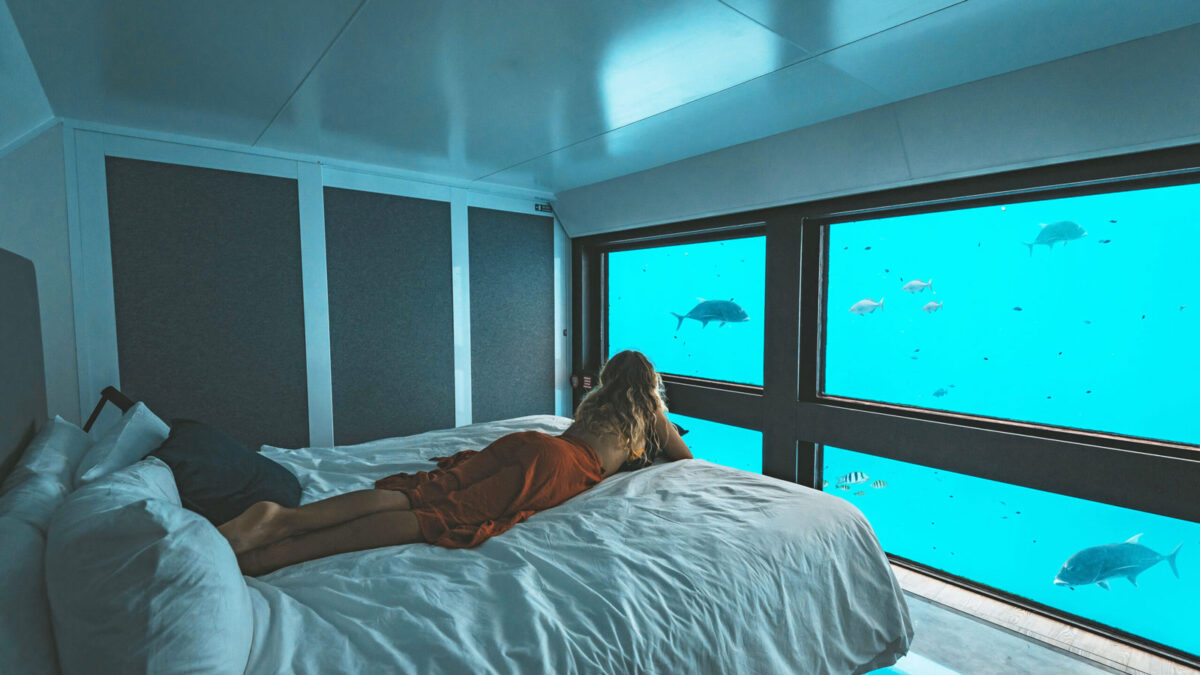An underwater hotel has been built next to the Great Barrier Reef, and Australians are losing their minds.
Some adore it. Some despise it. And some are conflicted. Why? Reefsuites is spectacular. It comprises of two suites hanging under a Pontoon and gives you an incredible view into the underwater world (there are also 28 swag like tents available to book and sleep in on the upper deck of the pontoon).
But it’s also luxurious. So – like any fancy hotel – it is inevitably adding to the very problem that is destroying the reef: climate change.
Before we get into that though – a bit of background. Reefsuites is Australia’s first underwater hotel. It opened in December 2019 just off of Hardy Reef and is managed by Cruise Whitsundays.
It’s not easy to get there. It’s an hour and a half flight to Airlie Beach from Brisbane and then a three-hour boat on top of that. When you get there though it’s all worth it: you can see more than 1,000 species of fish, turtles, rays, and giant, turtle-eating gropers through your giant windows.
The Reefsuites hashtag on Instagram is full of envy-inducing photos and gushing testimonies, showing what looks to be a dream holiday experience.
Twitter is likewise full of people calling it their “new dream vacation” and making comments like “Wow! This looks amazing.”
An underwater hotel? The rooms in Reefsuites are 15 feet underwater. I think I just found the setting for my next thriller. https://t.co/9DbwIbH8oq
— Allie Reynolds (@AuthorAllieR) February 16, 2022
Another wrote: “As much as I would love to experience this, building hotels in the endangered great reef does not sound prudent nor in line w conservation. But conscience in pocket, wow!”
Others pulled less punches, writing comments like: “Reefsuites… we are a virus.”
“Reefsuites”… we are a virus https://t.co/eNA4BuljKC
— Jan (@bagelmanjan) February 15, 2022
How did this ever make it past the idea phase? What the f**
— Evan (@EvanEggnog) February 15, 2022
Reefsuites say that reef experts and environmentalists have been consulted every step of the way. According to CN Traveller, Luke Walker, Chief Operating Officer of Journey Beyond, Cruise Whitsundays’ parent company, said: “Having fully submerged suites doesn’t impact the reef,” and “The physical impact of adding the underwater suites to a standard pontoon design is negligible.”
“We’ve had significant input from the GBRMPA to ensure the protection of the reef at every stage of development.”
Luke Walker
Marine biologist Johnny Gaskell, CN Traveller reports, said, “As far as I know, Reefsuites has no greater impact on the reef than having a boat out there.”
“Besides, any small impact is outweighed by the value it brings. It’s one thing to go out snorkelling or fishing for the day, and another thing entirely to spend the night underwater, surrounded by marine life. It allows people to make a connection with the environment that they wouldn’t otherwise get, and that makes all the difference.”
Reefsuites is also being spruiked for its economic benefits, as it is bringing more visitors and more money to the reef, which goes into protecting and managing it.
On that note, they’ve got a point: Great Barrier Reef Marine Park Authority Chief Scientist Dr David Wachenfeld told DMARGE in 2020 that tourists are vital to funding the management of the reef.
“Although The Great Barrier Reef gets about two million visitors per year, those visitors are visiting a marine park that’s bigger than two-thirds of countries on the planet,” Mr Wachenfeld told DMARGE.
“The visitation is concentrated mainly in two parts of the park,” Mr Wachenfeld added. “The actual density of visitation is really quite low, so the impact of tourism on The Great Barrier Reef is negligible.”
“I actually think that tourism has a very positive impact on the great barrier reef.”
Dr David Wachenfeld
“As far as I have ever encountered, everybody who has ever visited and seen The Great Barrier Reef falls in love with the place, and goes away with a stronger commitment to the [its] protection… and the environment more generally.”
Instead of under tourism, the biggest threat to the reef is climate change – a global problem, not a local one. That and insufficient funding to the reef’s protection agencies.
“If we want to have a Great Barrier Reef, we’re going to need to lift our game.”
The big question that remains then is: does staying at Reefsuites change peoples’ attitudes to the environment, and thereby public policy, in such a way that it outweighs the carbon emissions spent creating the suites (and getting the people to the reef)?
One for the scientists to ponder…
Read Next
